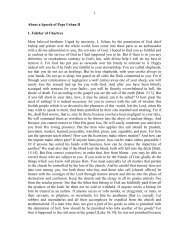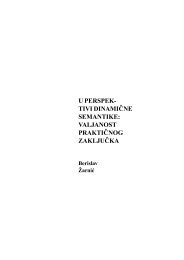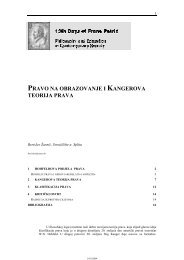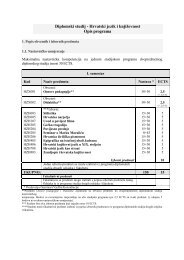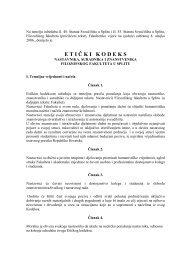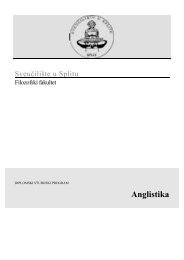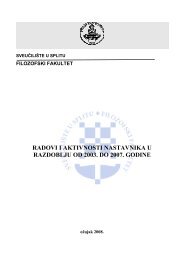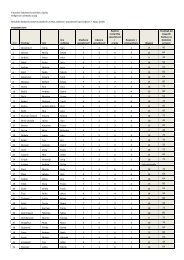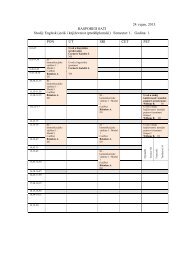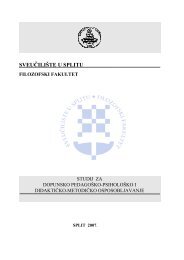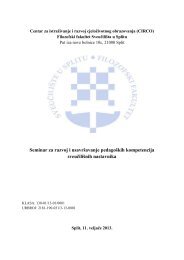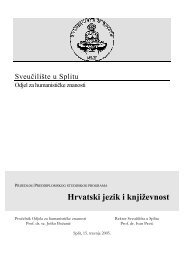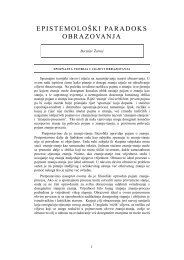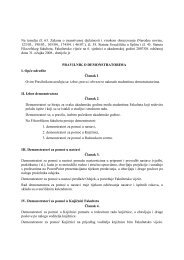English Studies
English Studies
English Studies
Create successful ePaper yourself
Turn your PDF publications into a flip-book with our unique Google optimized e-Paper software.
G R A D U A T E D E G R E E P R O G R A M M E : E N G L I S H S T U D I E S<br />
Prerequisites<br />
Course contents<br />
Recommended<br />
reading<br />
Supplementary<br />
reading<br />
Teaching<br />
methods<br />
Assessment<br />
methods<br />
Language of<br />
instruction<br />
Quality<br />
assurance<br />
methods<br />
to apply statistical methods to the analysis of linguistic properties and<br />
corpus generation.<br />
Competences and skills acquired upon the completion of Introduction to<br />
linguistics and other undergraduate courses in linguistics.<br />
The growing amount of natural language corpora and the widening use of<br />
computers in the analysis, education, and study of language have a profound<br />
influence on the way we perform natural language research and organize<br />
studies and teaching of languages.<br />
In this course we will go behind the scenes of natural language tools for<br />
analysing corpora like concordance and keyword-in-context tools, the<br />
structure and annotations of natural language corpora, internet resources and<br />
interactive systems for language teaching. We will run our own experiments<br />
and projects; generate corpora and natural language resources, as well as<br />
quantitative results from analyses.<br />
We will learn how statistical analysis is used to gain deeper insights into the<br />
properties of natural language, and how it is applied to natural language<br />
technologies.<br />
1. Teacher-generated materials: script, web page and slides.<br />
2. Manning, C. D., and Schütze, H. (1999). Foundations of statistical<br />
natural language processing. Cambridge, Mass.: MIT Press.<br />
Jurafsky, D., and Martin, J. H. (2000). Speech and language processing: an<br />
introduction to natural language processing, computational linguistics,<br />
and speech recognition. Prentice Hall series in artificial intelligence.<br />
Upper Saddle River, N.J.: Prentice Hall.<br />
Lectures (traditional / student-participation-encouraged / on-line) / Tutorials<br />
/ Practical sessions / Advisory hours / Research project / Independent<br />
research / Independent study.<br />
Student participation is encouraged through various tasks and activities,<br />
such as: problem-solving tasks, group work, pair work, online grammar<br />
development and testing tools, language games (etc.).<br />
The assessment of student knowledge/performance will be based on the<br />
following:<br />
1. Continuous assessment (diagnostic tests, independent homework/project<br />
tasks, achievement tests).<br />
2. Exam: written.<br />
Croatian/<strong>English</strong>.<br />
1. Anonymous student feedback via questionnaires and surveys (permanent<br />
online anonymous commenting facility and via paper questionnaires).<br />
2. Lecturers responsible for the same subject area collaborate closely and<br />
monitor each other’s work.<br />
3. Occasional class observations and assessment by departmental<br />
colleagues.<br />
4. Occasional open and public lectures for all students and colleagues also<br />
via live online technology (camera and microphone).<br />
5. Recording of lectures via web/digital cam for later analysis and offline<br />
16



